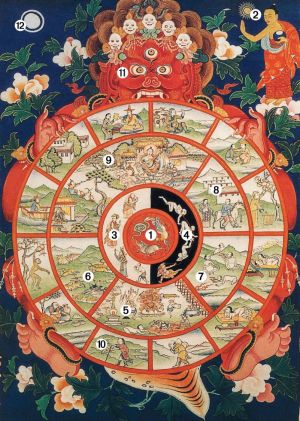Exhaustion of Karma
In Tibetan Buddhism, the exhaustion of karma is considered one of the primary causes of death. Karma refers to the universal law of cause and effect, where our actions, intentions, and habits throughout this and previous lifetimes plant seeds that shape our experiences, including our lifespan.
The Nature of Karmic Exhaustion
When the potential of a specific karmic pattern is fully ripened or exhausted, the conditions that supported life begin to dissolve. This does not imply a simple or fatalistic view of karma. Rather, it suggests that even powerful karmic forces have a lifespan of their own and can be influenced by skillful actions and practice.
Types of Karma Relevant to Death
- Life-Completing Karma: This refers to the core karmic pattern that sets the general potential for our lifespan in this particular life.
Shortening Karma: Negative actions and destructive mental patterns accumulated in the past or present life create obstacles to longevity. Lengthening Karma: Positive actions, generating merit, and practices that cultivate positive mental states can counteract shortening karma and potentially extend life. Practices to Address Karmic Exhaustion
- Ethical Conduct: Living a virtuous life based on Buddhist principles of non-harm, generosity, and wisdom helps prevent further accumulation of negative karmic patterns.
Purification Practices: Specific rituals, prayers, and mantras (like Vajrasattva practice) are designed to purify negative karma. Merit Accumulation: Acts of compassion, generosity, and offerings contribute to positive karma, which fosters well-being and can support longevity. Important Notes
- Impermanence: Even with skillful practices, death remains inevitable due to the Buddhist principle of impermanence.
Complexity: Karmic exhaustion is just one factor among the complex causes of death. It often interacts with the exhaustion of merit, life force, and external circumstances.
